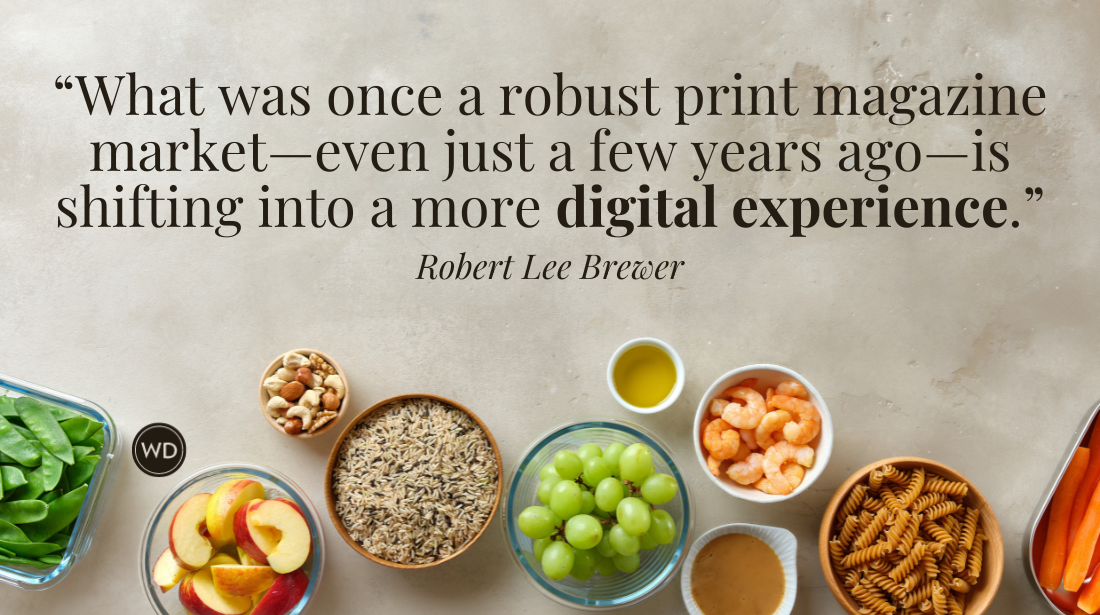Reveling in the Wonder of the Publishing Process
Senior Editor Robert Lee Brewer shares the wonder of the publishing process—both his own and that of several published authors.
After nearly 25 years of working in publishing, I still get caught up in the wonder of the publishing process. It’s still a thrill to receive unsolicited ARCs in the mail and see a new byline for something I’ve written. Even though I’ve been through so many publishing cycles and worked through so many editorial calendars, I still consider myself one of the luckiest people in publishing, because I think publishing is so wonderful and filled with wonder—and surprises!
Of course, there are sometimes bad surprises, but publishing can surprise in a good way as well. “I think the biggest surprise during the whole publishing process is how enthusiastic the entire team is for my book,” says Dana Elmendorf of her experience with publisher Mira Books on her novel In the Hour of Crows. “On our first marketing call, there were about eight people and each one of them gushed about my book. And I sat there thinking, Holy cow, they’re talking about your book, Dana! It was truly an emotional moment for me.”
While it’s true many new writers can be intimidated by the process of submitting to agents and publishers, these same gatekeepers are often the most engaged advocates for their authors. From the editors to the publicists, it’s common for everyone on the publishing team to be locked on for their authors, but it doesn’t stop there.
“The biggest shock was getting blurbs from well-established authors,” says Marcus Kliewer, debut novelist of We Used to Live Here. “It’s still surreal to have anyone reading my work, let alone writers I’ve looked up to for years. When the first quotes came in from Alma Katsu and Nick Cutter, I literally had to sit down.”
Even seasoned pros can find new situations that spark joy, as Claudia Mills, author of more than 60 books, including The Last Apple Tree, explains, “Usually everything in publishing takes forever. This time, though, my editor replied within four hours of receiving the manuscript from my agent to say she meant to take a peek, but couldn’t stop reading and loved it, and would take it to an editorial meeting. Less than a week later, we had an offer—a record for me in my four decades in the business!”
Validation and praise from others can be a huge part of the wonder of publishing, but there’s also that creative spark that comes from unexpected sources. “The part of the process that is always a surprise—in a good way—is how the team works with the artist to create the cover,” says Samira Ahmed, author of This Book Won’t Burn. “I love seeing how the themes and story are given life via design and illustration. It’s a unique sort of translation and I learn something new with each new cover design process.”
“The best advice I can give to any writer, aspiring or otherwise, is to keep writing. Don’t wait for an agent, a publisher, a contract, just keep writing and editing, every single day. Treat your writing like the job that it is,” advises Kimberly Belle, bestselling author of The Paris Widow. “Some days you’ll end with a lot of words, other days you’ll stare at your screen and pull out your hair. In the end, it all evens out and before you know it, you’ll have a whole book.”
After all, the wonder of publishing doesn’t just happen. It takes hours of time spent reading, writing, thinking, and communicating—both with yourself and the world. Experiencing the splendor of publishing success is the result of dedicated creative work.
“The business of writing is a tough one, and it doesn’t always make sense,” explains Greg Iles, bestselling author of Southern Man. “A lot of bad books get published, and even sell, while some decent or even good ones never do. In general, though, if you have the goods as a writer, your work will get noticed and sell, at least to a publisher, if not to millions of readers.”
Or as Katee Robert, author of Blood on the Tide, says, “I would advise authors to chase their joy and just get that book out on paper, whatever their process might look like. They can worry about marketability and all the business details once the book is finished. The true magic happens in the joy, and that’s the one thing that’s consistent, whether you’re writing your first book or your hundredth.”
As someone who’s written hundreds of print articles and thousands of digital posts and published dozens of books, I whole-heartedly echo Robert’s sentiment that the true magic happens in the creative process, whether that’s writing the first draft, working through revisions, or considering feedback from agents and editors.
“I’ve been writing professionally for decades, but I’d never really understood the value of pushing yourself through an ongoing revision process,” says Jennifer Romolini, author of Ambition Monster. “Over the course of 18 months, I revised and revised and revised this book. My first draft was clean and ‘good,’ but the book we’re publishing is the best work I’ve ever done.”
The team concept may be one of the more underrated wonders of publishing. Whether it’s the revision process mentioned by Romolini, the cover design touched on by Ahmed, or the enthusiasm espoused by Elmendorf, publishing involves more than one person. Publishing is a collaborative act that requires multiple people working together to produce something of great value to even more people. For it to work, the players must have each other’s backs.
“I didn’t realize just how necessary it is to have an editor who really understands not only your work, but you, too,” says Chimene Suleyman, author of The Chain. “There are points in the process where life gets in the way, and you need a team around you who can bring the best out of you as a person, not only the work.”
Maybe that’s what makes publishing such a wonderful business. In so many industries, there are incentives for the individual to succeed against other individuals. As an editor who has worked with hundreds of writers over the years, I consider their success my success. Talking to hundreds of other agents, editors, publicists, marketers, book buyers, publishers, and other publishing professionals, I can say that is a common goal for most of us (there’s always room for a few people who haven’t figured it out yet). In many respects, the wonder of publishing is that it’s a business of perpetual positivity—even when people on the outside try to prognosticate its eventual demise. The wonder of publishing is that it continues to dare to succeed.
“Stop talking yourself out of your book dream,” says Christina Myers, award-winning author of Halfway Home: Thoughts From a Midwife. “Stop asking ‘what if’ and filling in the answer with the worst-case scenarios, like ‘What if I can’t finish this?’ and ‘What if no one wants to publish it?’ Instead, start asking ‘what if’ and filling in the answer with the best possibilities: What if I finish writing this book and it’s great? What if it gets published and readers love it? What if I get the chance to write more books? The former will slow you down and make you doubt yourself; the latter will convince you to keep going.”
As someone who still finds joy in the publishing process, I couldn’t agree more.
Robert Lee Brewer is Senior Editor of Writer's Digest, which includes managing the content on WritersDigest.com and programming virtual conferences. He's the author of 40 Plot Twist Prompts for Writers: Writing Ideas for Bending Stories in New Directions, The Complete Guide of Poetic Forms: 100+ Poetic Form Definitions and Examples for Poets, Poem-a-Day: 365 Poetry Writing Prompts for a Year of Poeming, and more. Also, he's the editor of Writer's Market, Poet's Market, and Guide to Literary Agents. Follow him on Twitter @robertleebrewer.








